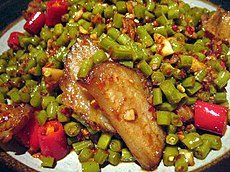Hunan cuisine
| Hunan cuisine | |||||||

Hunan cured ham with pickled yardlong beans
|
|||||||
| Chinese | 湖南菜 | ||||||
|---|---|---|---|---|---|---|---|
|
|||||||
| Xiang cuisine | |||||||
| Chinese | 湘菜 | ||||||
|
|||||||
| Transcriptions | |
|---|---|
| Standard Mandarin | |
| Hanyu Pinyin | Húnán cài |
| Transcriptions | |
|---|---|
| Standard Mandarin | |
| Hanyu Pinyin | xiāng cài |
Hunan cuisine, also known as Xiang cuisine, consists of the cuisines of the Xiang River region, Dongting Lake, and western Hunan province in China. It is one of the Eight Great Traditions of Chinese cuisine and is well known for its hot spicy flavour, fresh aroma and deep colour. Common cooking techniques include stewing, frying, pot-roasting, braising, and smoking. Due to the high agricultural output of the region, ingredients for Hunan dishes are many and varied.
The history of the cooking skills employed in Hunan cuisine dates back to the 17th century. During the course of its history, Hunan cuisine assimilated a variety of local forms, eventually evolving into its own style. It now contains more than 4,000 dishes, such as fried chicken with Sichuan spicy sauce (麻辣鸡丁; 麻辣雞丁; málà jīdīng) and smoked pork with dried long green beans (干豆角蒸腊肉; 干豆角蒸臘肉; gāndòujiǎo zhēng làròu).
Hunan cuisine consists of three primary styles:
Known for its liberal use of chili peppers, shallots and garlic, Hunan cuisine is known for being dry hot (干辣) or purely hot, as opposed to Sichuan cuisine, to which it is often compared. Sichuan cuisine is known for its distinctive mala (hot and numbing) seasoning and other complex flavour combinations, frequently employs Sichuan peppercorns along with chilies which are often dried, and utilises more dried or preserved ingredients and condiments. Hunan cuisine, on the other hand, is often spicier by pure chili content and contains a larger variety of fresh ingredients. Both Hunan and Sichuan cuisine are perhaps significantly oilier than the other cuisines in China, but Sichuan dishes contains a lot more oil than Hunan dishes. Another characteristic distinguishing Hunan cuisine from Sichuan cuisine is that, in general, Hunan cuisine uses smoked and cured goods in its dishes much more frequently.
...
Wikipedia
